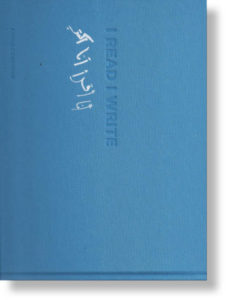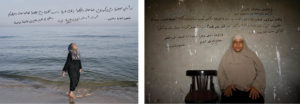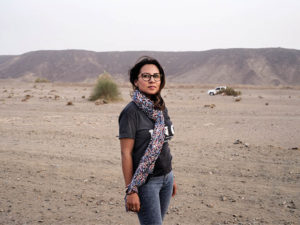By Laura Boushnak
Rimal Books, Cyprus, 2019
Hardcover, 280 x 220 mm, 180 pages, €45
Full-color photographs, English and Arabic.
Reviewed by Michael Jansen
It is shocking that in the twenty-first century, women in the Arab world still struggle to learn how to read and write, basic skills central to life all over the world. Laura Boushnak has collected in this book stories and photographs of women from half a dozen Arab countries who are not only striving for literacy but also attaining university degrees in societies where many women are denied an education.
In her Introduction, Boushnak speaks of her father who was not prepared to invest the family’s meager resources into her education. “Had you been born a boy, I would have paid for your education,” he said and urged her to enroll in a secretarial course. She took a job as a receptionist at an American school for girls to earn enough “to pay fees for a social sciences degree at the Lebanese University, in parallel with a distance learning course at the New York Institute of Photography.” Her studies gave Boushnak the skills to tackle the subject of this book.
In Egypt, where 35 percent of women are illiterate, she encountered mature women seeking release from illiteracy and ignorance. In the first sentence she wrote, Nadia asked, “Who am I?” Ejlal Muawad, 53, whose husband did not want her to leave the house, argued that “not being able to read is like being blind.”
In Jordan, Boushnak interviewed teenage girls who could read and write but sought further education and vocational training. Left to run the household while her mother went to work, Wafa, 16, is photographed standing against a wall. She wants to be an architect.
In Yemen, Boushnak photographed women who see the world from the narrow window of their bleak, black niqab. Fayza, 25, married off at eight, divorced, and married again at 14, divorced with three children at 18, has enrolled in business classes at university despite parental opposition. She sums up the fate of her sisters: “Traditions and customs have oppressed Yemeni women.” Determined to study law to defend women, Hanan, 18, is the only woman in a class of 22 in law school – attending with her parents’ approval.
Tunisia’s first president, Habib Bourguiba, gave women the legal and social rights they now must defend against conservative fundamentalists. Boushnak captured Shams, 21, sitting on the ground in front of a closed gate topped by barbed wire. “I resist and resistance is female,” she wrote. She is a university student of English literature and the president of her student union.
In Saudi Arabia, Boushnak shows bareheaded Alaa, 25, standing in the desert wearing jeans and a T-shirt. She is the Arab region’s sole female ocularist, making false eyes patients have lost due to illness or accident.
Accepted to study English literature at an American university, Asma, 21, has been trapped in Gaza by Israel’s refusal to grant her a travel permit. Sally, 18, who plans to study medicine in Germany, has managed to cross Gaza’s Egyptian border at Rafah after many delays and disappointments. Boushnak’s last photo is of girls in their uniform at an UNRWA school: future literate women of Gaza.




